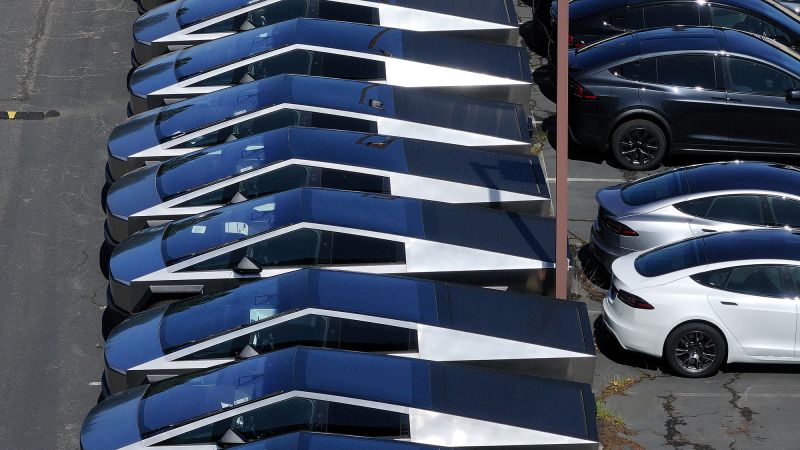Tesla, Inc., the American electric vehicle (EV) maker led by its high-profile CEO Elon Musk, is currently navigating extremely turbulent waters due to a confluence of challenges. Placed under significant pressure by actions taken during President Donald Trump’s trade war, Tesla finds itself in a precarious position, much like many other American manufacturers. Yet, Tesla’s situation is exacerbated by Musk’s close ties to Trump, a relationship that has drawn both friends and foes into the mix.
The link between Musk and Trump has been termed a “first buddy” scenario, illustrating Musk’s influential position within the government. However, this relationship complicates Tesla’s standing with investors and consumers alike. As the company approaches an important earnings report, it faces a dilemma: continue its allegiance to Trump and face the risk of alienating customers who oppose his policies, or distance itself and potentially incur the wrath of the Trump administration. This predicament—sometimes referred to as a catch-22—arises from Musk’s unique position as a business leader intertwined with political dynamics.
The first quarter of 2024 saw Tesla suffer its most significant drop in sales in recent history, an unsettling change after a consistent pattern of double-digit growth. Investors are eager to understand the implications of the administration’s newly imposed 25% tariffs on imported vehicles. It raises important questions regarding when Musk will shift his attention back from the government—and his involvement in a Department of Government Efficiency initiative known as DOGE—to focus on revitalizing Tesla. Expectations are also mounting around Tesla’s future plans, including advancements in self-driving technology, a fleet of autonomous robotaxis, and the launch of more affordable vehicle models and humanoid robots.
For many in the investment community, positive news on these fronts could serve to reverse Tesla’s declining share prices, which have lost approximately half their value since mid-December. Analysts like Dan Ives from Wedbush Securities have termed Musk’s ongoing high-profile government role a “code red situation” for Tesla. Ives argues that the company needs Musk to step back from his government commitments to fully return to the role of CEO, emphasizing that brand reputation plays a critical role in consumer loyalty and sales.
As brand perception increasingly comes into play, Tesla over the years has also faced stiff competition from other EV manufacturers worldwide, with a notable rise in competition in China. Should issues regarding sales persist amid ongoing scrutiny of Musk’s political connections, the situation may escalate into a deeper downward trend for Tesla’s stock. According to Ives, the combination of tariffs, troubles within DOGE, and damage to Tesla’s brand has created a “perfect storm.”
Interestingly, despite its unique position, Tesla has reportedly weathered the tariffs better than other automakers due to its operational strategies, such as minimizing reliance on imports from overseas factories. However, when it comes to its high-end Model S and Model X cars in China—where retaliatory tariffs have reached 125%—Tesla has had to pause new orders. Musk has candidly acknowledged that the impact of these tariffs is “not trivial” and that Tesla is not entirely insulated from the adverse effects.
Tesla’s trajectory has also been affected by investor sentiment surrounding Musk’s relationship with Trump. Musk became Trump’s largest financial donor in the previous year and has enjoyed a close advisory role. While some investors initially viewed this connection as beneficial, supporting hopes for favorable policies, it has now started to backfire, particularly following a range of anti-Trump sentiments among consumers. The electric vehicle market in China, which is pivotal for Tesla’s growth—a country where it accounted for 21% of its revenue in 2024—looks promising yet precarious.
Moreover, recent protests and vandalism at Tesla facilities have made headlines, reflecting growing dissatisfaction, likely tied to Musk’s political engagements. Investor inquiries on platforms regarding these issues illustrate the clear concern about brand damage linked to Musk’s political activities.
Despite the increasing pressures, Musk’s ambitious vision for Tesla remains intact. He has made bold promises regarding autonomous robotaxis, indicating an impending fleet that could offer ride-hailing services. However, delays in executing these plans could prove detrimental to Tesla’s financial outlook. The recent wait for updates on the planned driverless service in Austin underscores the competitive landscape occupied by Tesla, with other companies like Uber and Waymo advancing their own driverless initiatives.
In the rapidly shifting dynamics of the EV market, Musk’s ability to manage both Tesla’s operational focus and its political entanglements will be closely monitored in the coming days. The responses he provides during the upcoming earnings call will be pivotal in shaping investor confidence, with analysts closely scrutinizing any mention of tariffs, brand strategy, and future technological advancements.



